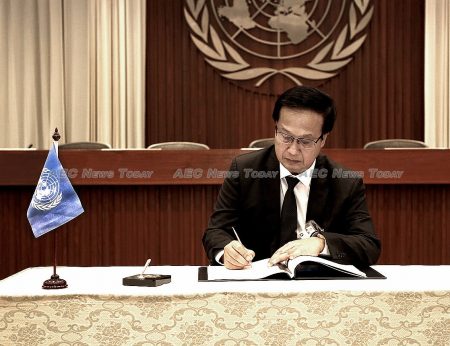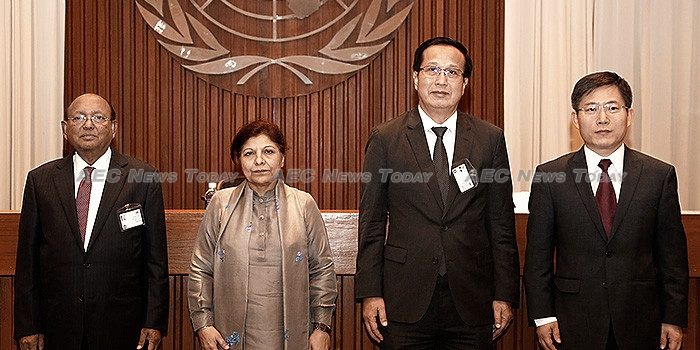Cambodia has become the first Asean member nation to sign up to a UN framework aimed at the establishment of paperless cross-borer trade in Asia.
The tiny Southeast Asia Kingdom joined Bangladesh and regional heavyweight China in a signing ceremony at the United Nations Economic and Social Commission for Asia and the Pacific (Escap) headquarter in Bangkok last Friday, August 29 as part of the High-Level Dialogue on Enhancing Regional Trade through Effective Participation in the Digital Economy.
The Framework Agreement on Facilitation of Cross-border Paperless Trade in Asia and the Pacific (FAFCPTAP) is designed to streamline cross border trade by eliminating paper records, with even a partial implementation capable of boosting exports by $36 billion annually, cutting as much as 44 per cent off the time required to organise exports, and slash up to 31 per cent from export costs. Full implementation could see export trade in the Asia-Pacific region top $250 billion annually, a recent Escap study found.
According to Escap executive secretary, Dr Shamshad Akhtar, on average cross border trade transactions among 27 to 30 different parties involve 40 documents, 200 data elements — 30 of which are repeated at least 30 times — and the re-keying of 60 to 70 per cent of data at least once.

Citing Indian exports to Bangladesh as a typical scenario that the FAFCPTAP is designed to eliminate, Dr Akhtarthe said exporters must obtain up to 330 signatures on 17 documents at multiple stages to sell their products into the neighboring market.
Changing from paper to electronic solutions helps to simplify trade processes, minimize documentary requirements, promote transparency, increase the security of trade operations, and boost economic competitiveness, Dr Akhtar added.
Open to all 43 Escap member states, the FAFCPTAP will assist signatory nations in implementing
- Regional harmonization and coordination to help boost cross border paperless data exchange in the region, resulting in cost and time savings.
- Implement strong capacity-building mechanism to enable developing countries to close the e-readiness gap and implement cross-border electronic data exchange.
- Assist members with different implementation capacity levels to take action based on their initial respective e-readiness levels.
- Help member countries to migrate to an electronic data exchange environment with pilot projects designed to help members iterate and adjust their systems before engaging in actual cross-border trade data exchange
- The digital implementation of trade facilitation measures, including the WTO Trade Facilitation Agreement and other bilateral and sub-regional agreements by Escap.
As to when Cambodia will be in a position to begin introducing paperless cross-border transactions Cambodia Minister of Commerce, Pan Sorasak, who signed the agreement on behalf of Cambodia,would not speculate. The fist step is to prepare the information technology systems in all related authorities, draft regulations, and train more human resources in fields related to paperless transactions, he said, adding that Escap was providing considerable knowledge-based assistance.
The treaty is open for signing at the United Nations headquarters in New York until September 30, 2017 and will enter into force 90 days after five countries have ratified the agreement. Countries which have expressed a desire to sign the FAFCPTAP include Azerbaijan, Bhutan, Lao PDR, Iran, Pakistan and Samoa.
Featured Image UNESCAP
Related:
- Economic development requires rule of law: ESCAP (The Phnom Penh Post)
- ESCAP and ASEAN: working together to help the region (The Phnom Penh Post)
- E-commerce RCEP Chapter: Have Big Tech’s Demands Fizzled? (Electronic Frontier Foundation)


